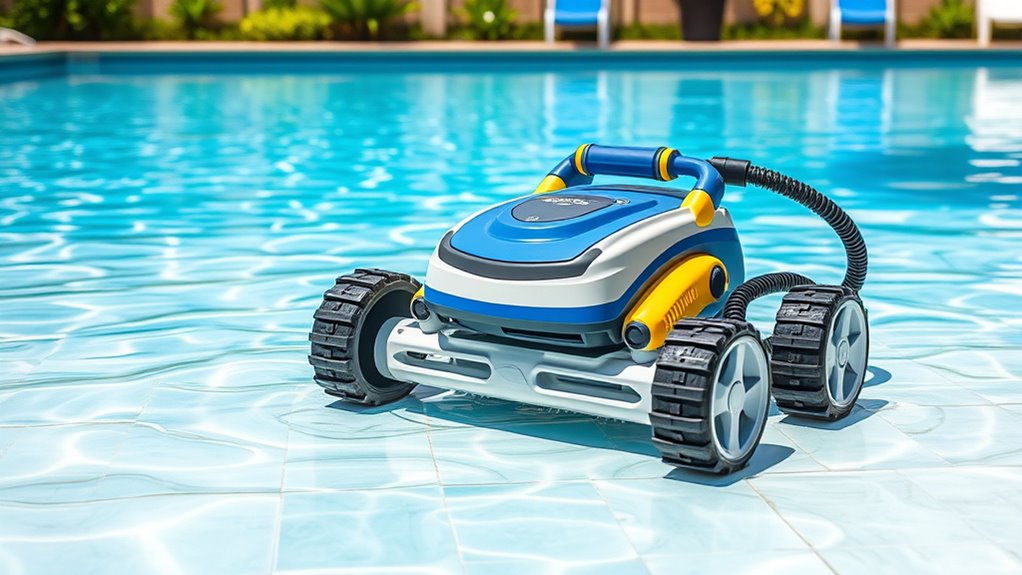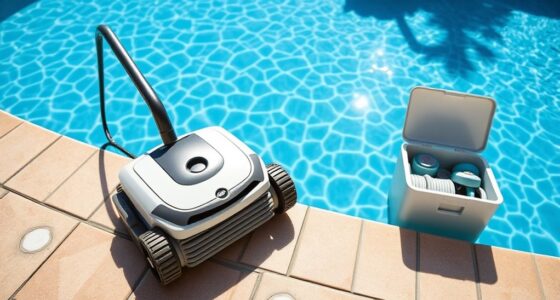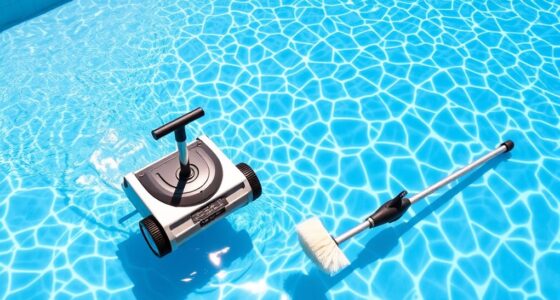To extend the lifespan of your pressure pool cleaner, you should regularly inspect and clean filters, hoses, and brushes to prevent debris buildup. Store it properly in a dry, cool place when not in use, especially during off-seasons. Keep an eye on worn parts and replace them promptly, and follow manufacturer guidelines for maintenance and operation. For more tips on keeping your cleaner in top shape, continue exploring practical ways to maintain your equipment.
Key Takeaways
- Perform regular maintenance by cleaning filters, inspecting hoses, and replacing worn parts promptly.
- Store the cleaner properly in a dry, cool environment, draining water to prevent freezing damage.
- Follow manufacturer guidelines for optimal operation, avoiding excessive or improper use.
- Schedule routine inspections and professional servicing to address issues early and ensure compatibility.
- Use the cleaner within recommended pressure levels to reduce stress and prolong component lifespan.
Regularly Inspect and Clean Your Cleaner
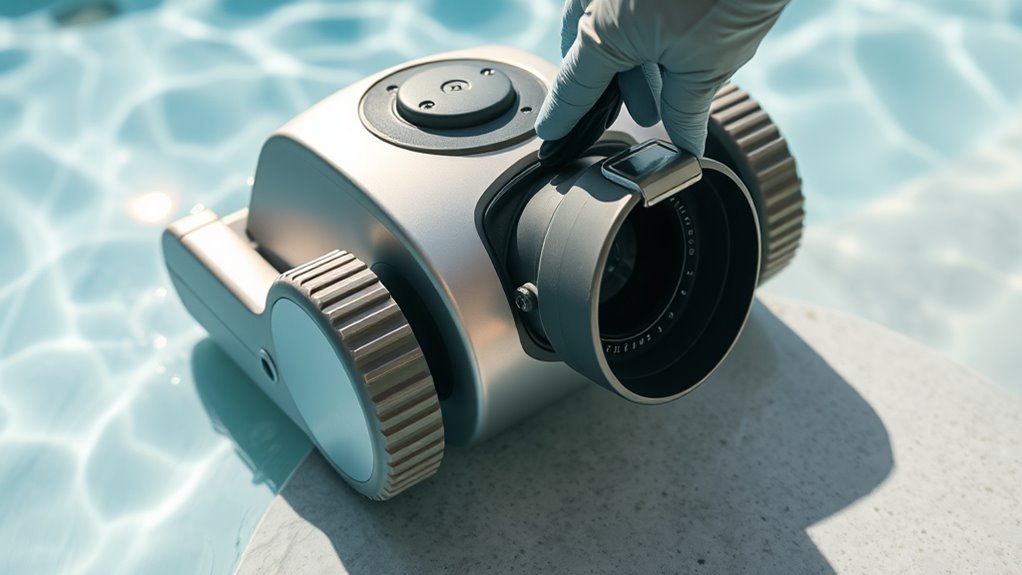
Regularly inspecting and cleaning your pressure pool cleaner is essential to keep it functioning efficiently. Start by checking the filter for debris or clogs, which can reduce suction and cleaning effectiveness. Regular filter maintenance guarantees ideal water flow and prevents strain on the cleaner’s motor. Additionally, pay attention to the motor during inspections—listen for unusual noises or signs of overheating, which may indicate motor troubleshooting needs. Clean the filter basket and inspect hoses for cracks or blockages, replacing parts as needed. Keeping your cleaner’s components in good condition minimizes wear and tear, prolongs its lifespan, and maintains peak performance. Regular maintenance saves you from costly repairs and ensures your pool stays spotless with less effort. Regular maintenance also helps in preventing damage, which extends the overall lifespan of your pressure pool cleaner. Ensuring all parts are free of debris or blockages also contributes to efficient operation and longevity. Performing routine checks and adhering to manufacturer guidelines can further maximize efficiency, and understanding contrast ratio helps in optimizing the cleaning process and component longevity. Moreover, staying informed about the latest AI safety measures can help you implement smarter maintenance practices and avoid potential malfunctions.
Properly Store When Not in Use
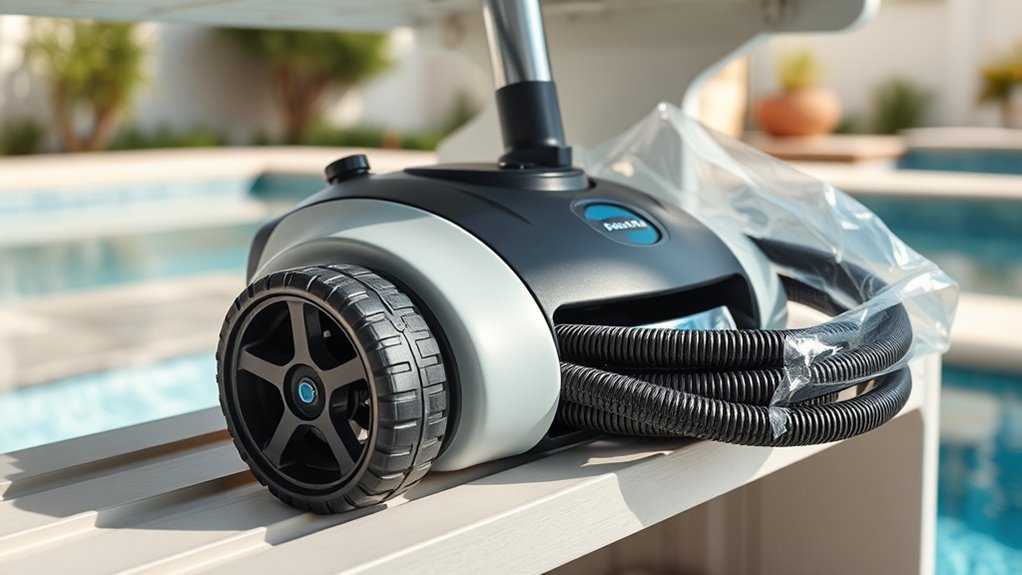
After ensuring your pressure pool cleaner is clean and functioning properly, storing it correctly when not in use helps maintain its condition. Proper storage tips prevent damage and extend its lifespan. To winterize techniques effectively, follow these steps:
Proper storage and winterization keep your pressure pool cleaner in top condition year-round.
- Drain all water from hoses and the cleaner to prevent freezing damage
- Store the cleaner in a cool, dry place away from direct sunlight
- Keep it in a clean, protected spot to avoid dust and debris buildup
- Using specialized storage solutions can further safeguard your equipment during off-season periods.
- Additionally, inspecting and maintaining seals regularly ensures optimal performance and prevents leaks during storage. Regular checks on pressure pool cleaner components can also help identify potential issues early and prolong the device’s operational life, especially by monitoring industry trends that influence equipment longevity. Incorporating proper installation and venting practices, as recommended by safety standards, further enhances the longevity and safe operation of your equipment.
Maintain and Replace Worn Parts
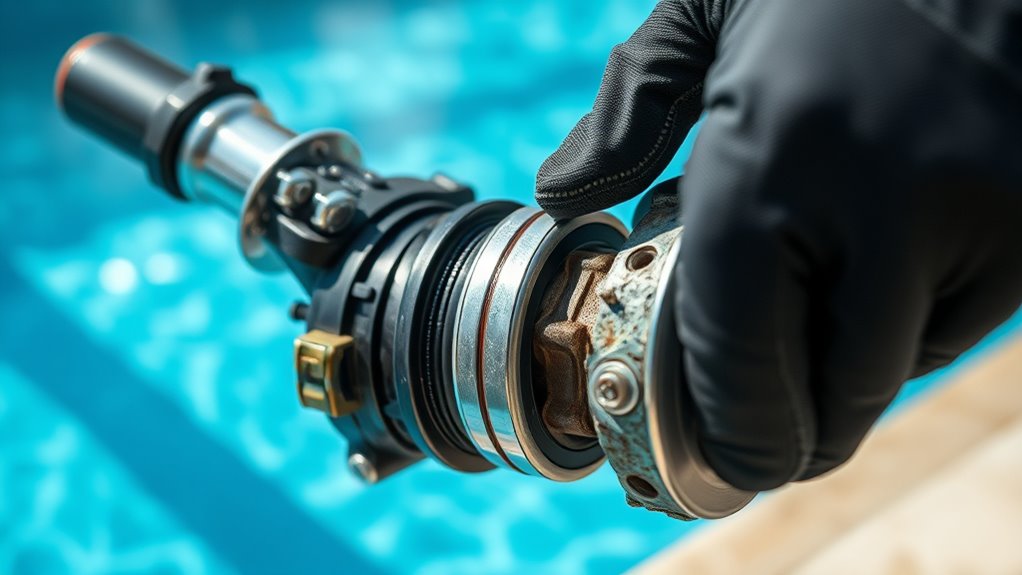
Maintaining your pressure pool cleaner involves inspecting its parts regularly and replacing any that show signs of wear. Focus on filter maintenance by cleaning or replacing filters to ensure *ideal* performance and prevent clogging. Check hoses, brushes, and nozzles for cracks, leaks, or damage, and replace worn components promptly. Worn or damaged parts reduce cleaning efficiency and can strain the motor, shortening its lifespan. Keep an eye on the internal belts or gears, replacing them when they show signs of deterioration. Regular component replacement not only keeps your cleaner working effectively but also prolongs its overall life. Additionally, understanding filter types and their proper maintenance can significantly impact the longevity of your equipment. Using proper cleaning techniques tailored to specific filter materials helps prevent premature wear and extends the life of your parts. Staying proactive with these maintenance tasks helps avoid costly repairs and ensures your pool stays clean all season long. Incorporating preventive maintenance practices can further extend the lifespan of your cleaner by addressing minor issues before they become major problems. Moreover, adopting lifestyle habits such as scheduling routine inspections can keep your equipment running smoothly year-round. Regularly updating replacement parts with high-quality components supports optimal operation and prevents unnecessary downtime.
Optimize Pool Water Chemistry and Conditions
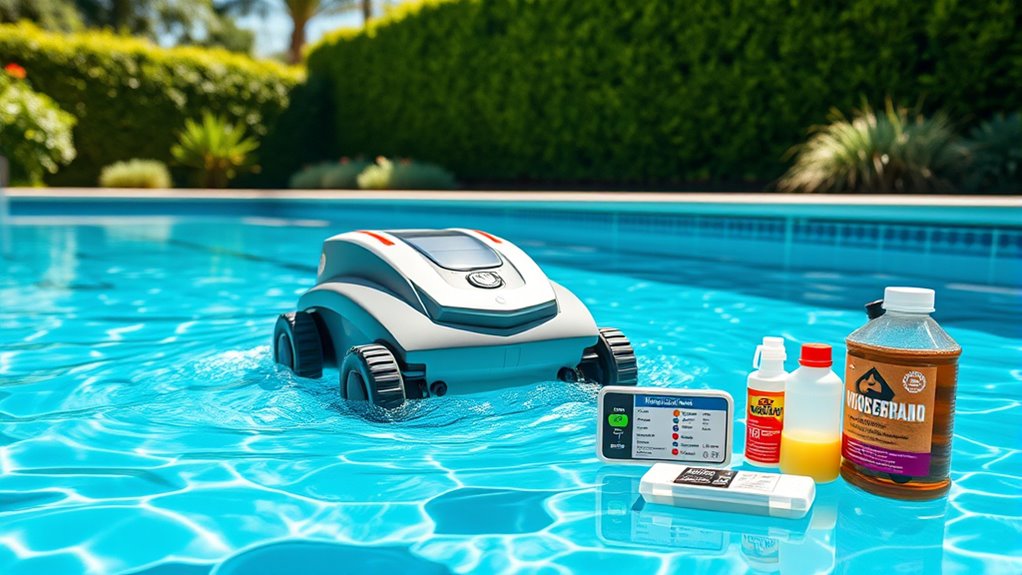
To guarantee your pressure pool cleaner works effectively, you need to enhance your pool water chemistry and conditions. Maintaining proper chemical balance prevents buildup and reduces strain on your cleaner. Focus on consistent testing and adjusting pH, alkalinity, and sanitizer levels. Good water filtration ensures debris isn’t trapped or recirculated, easing your cleaner’s workload. To improve conditions:
- Keep pH levels between 7.2 and 7.6 for ideal chemical balance
- Regularly clean and backwash your filter to sustain water filtration
- Monitor chlorine or sanitizer levels to prevent algae growth and cloudy water
- Embrace the importance of vibrational energy in maintaining a positive environment that supports optimal pool conditions and cleaner longevity.
- Ensuring proper water texture can also aid in reducing debris buildup and improve overall water quality.
- Consistently monitoring and adjusting chemical parameters can help prevent trust issues that may arise from neglecting water maintenance, ensuring your cleaner operates smoothly.
- Additionally, utilizing automation in business concepts like automated chemical dosing systems can enhance consistency and reduce manual testing efforts.
- Incorporating regular maintenance routines can further extend the lifespan of your pressure pool cleaner and keep your pool in optimal condition.
Follow Manufacturer Guidelines and Service Schedules
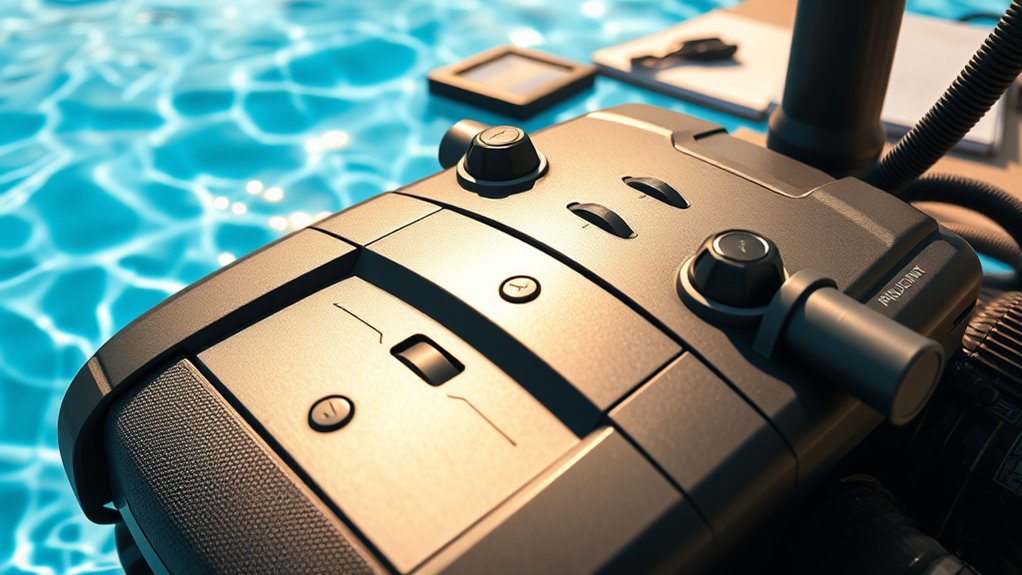
Following the manufacturer’s guidelines and service schedules is essential for keeping your pressure pool cleaner operating at peak performance. Adhering to recommended cleaning frequency prevents buildup and reduces strain on your unit, extending its lifespan. Regular maintenance, as specified in the user manual, helps identify issues early, ensuring your cleaner functions efficiently. It also safeguards your manufacturer warranties, which often require routine servicing for coverage to remain valid. Sticking to these guidelines minimizes unexpected repairs and costly replacements. Keep track of service dates and follow recommended procedures for filter cleaning, belt adjustments, and part inspections. Being aware of platform features like notifications and scheduling tools can help you stay on top of maintenance tasks. Additionally, proper storage during the off-season can prevent damage and prolong your cleaner’s life. By respecting these schedules, you’ll ensure your pressure pool cleaner stays in top shape longer, saving you time and money while maintaining a spotless pool.
Frequently Asked Questions
Can Pressure Pool Cleaners Be Repaired if They Break Down?
If your pressure pool cleaner breaks down, you’ll be glad to know it can often be repaired. Regular pool cleaner maintenance helps prevent issues, and with proper repair techniques, many problems like clogs or motor faults can be rectified. You can troubleshoot minor problems yourself or seek professional repair services. Keeping up with maintenance ensures your cleaner stays efficient and lasts longer, saving you money and effort in the long run.
What Are Common Signs Indicating My Cleaner Needs Replacement?
Your pool cleaner’s signs of wear can be shocking—like spotting a crack in your favorite vase. When you notice decreased cleaning performance, strange noises, or frequent breakdowns, it’s time to contemplate replacement. Regular pool cleaner maintenance helps catch these signs early. If repairs no longer restore efficiency or the device shows persistent issues, replacing it ensures your pool stays spotless without wasting time and effort.
How Does Water Temperature Affect Pressure Pool Cleaner Longevity?
Water temperature plays a significant role in your pressure pool cleaner’s durability. High water temperatures can cause parts to wear out faster, reducing the cleaner’s lifespan. Conversely, cooler water helps maintain the cleaner’s efficiency and extends its durability. You should monitor water temperature regularly and avoid operating your cleaner in extreme heat, as it can strain the motor and components, ultimately shortening its lifespan.
Are There Eco-Friendly Cleaning Products Compatible With Pressure Cleaners?
Did you know that using eco-friendly detergents can reduce harmful chemical runoff by up to 80%? When choosing cleaning products for your pressure pool cleaner, opt for eco-friendly detergents and biodegradable solutions. These products are compatible with most pressure cleaners and help protect the environment while maintaining your pool’s cleanliness. Always check manufacturer guidelines to guarantee compatibility, so your cleaner stays efficient and lasts longer.
How Often Should I Upgrade My Pool Cleaner Model?
You should consider upgrading your pool cleaner model every 3 to 5 years, depending on usage and wear. Regular model upgrades can enhance efficiency and incorporate new features. To maximize longevity, follow longevity tips like proper maintenance, cleaning filters regularly, and storing it properly during off-seasons. Staying updated with the latest models guarantees you get better performance and durability, making the investment worthwhile over time.
Conclusion
By regularly inspecting, cleaning, and storing your pool cleaner properly, you’ll keep it running smoothly for years. Don’t forget to maintain and replace worn parts, and keep your pool water chemistry in check—think of it as giving your cleaner a good tune-up. Following the manufacturer’s guidelines guarantees it stays in tip-top shape. With these tips, your pressure pool cleaner will be as reliable as a trusty steed, ready to serve your pool day in and day out.
